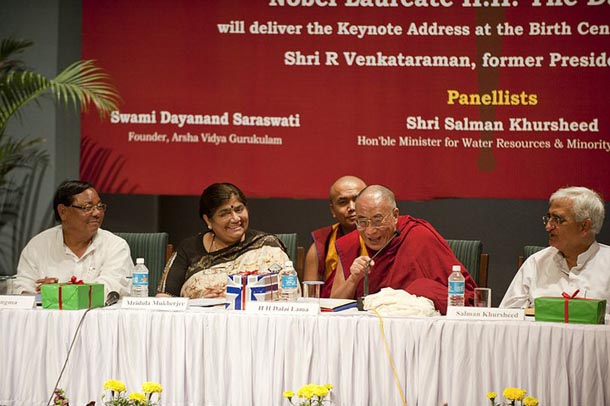 Dharamshala: - On April 2nd in the Indian capital New Delhi during his lecture on "Non-Violence and Spiritual Values of Secular India" in honour of former Indian President R. Venkataraman, Tibetan spiritual leader His Holiness the Dalai Lama urged the young Indians to "play a more active role in preserving their centuries old tradition of non-violence and propagating it to the outside world".
Dharamshala: - On April 2nd in the Indian capital New Delhi during his lecture on "Non-Violence and Spiritual Values of Secular India" in honour of former Indian President R. Venkataraman, Tibetan spiritual leader His Holiness the Dalai Lama urged the young Indians to "play a more active role in preserving their centuries old tradition of non-violence and propagating it to the outside world".
In praising India's democratic traditions, the Tibetan leader said that it was India which introduced him to the true meaning of democracy and that young Indians should do everything they could to sustain their rich traditions developed over thousands of years through overlapping of cultures.
"......For thousands of years this country has developed different views and (imbibed) in its existing philosophies those of Buddhism, Islam Christianity and later Sikhism.... at grassroots this tradition is centuries old and that is the real strength of India," he said.
"But to the younger generation of Indians, who have a lot of interest in technology and science, I feel it is worthwhile to remind them of their traditions, I would say develop your country and also maintain these traditions," he said.
The Tibetan spiritual leader said that young Indians ought to pay greater attention to eliminating the inequities of their society: "like the caste system, the dowry system and other discriminations that are prevalent in your society", while further commenting on the all too common occurences of corruption in India: "In this country most people practice religion, they would recite shlokas (and pay respects to idols), but whenever they find opportunity they also take to corruption, when in reality true followers of religion have to be honest."
In the lecture His Holiness also shared several memories of past dealings with both Indian and Chinese leaders. Recalling his meetings with India's first prime minister Jawaharlal Nehru, he said he found the fact that he could disagree with him without annoying him a testament to the tradition of healthy criticism in India.
"I thought in China, leaders were not like that, I have learnt this dealing with the Chinese leadership for nine years. Gen Mao (Zedong) though was an exception, but I later found his words were not reflected in reality or implemented on the ground," he said.
Concerning economic progress India might be behind China, His Holiness the Dalai Lama conceded, but he went on to say that India's rich values of democracy and freedom places the country in a better position to play a positive and effective role in the world. His Holiness also quoted BJP leader L K Advani as telling him once that the success of democratic practice in India was the existence of a thousand year of tradition of criticism.
Labelling himself a "messenger of India's ancient thought" and characterizing his relationship with India as that of a "chela and guru", he said Indians should take an active role in taking the message of non-violence inherent in their tradition to the world on a human level.


![Tibet has a rich history as a sovereign nation until the 1950s when it was invaded by China. [Photo: File]](/images/stories/Pics-2024/March/Tibet-Nation-1940s.jpg#joomlaImage://local-images/stories/Pics-2024/March/Tibet-Nation-1940s.jpg?width=1489&height=878)















